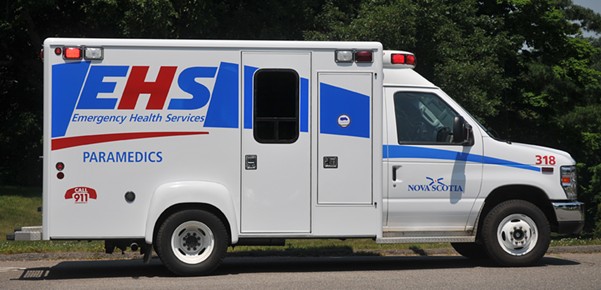“Stay with me,” Krista Lane speaks clearly and calmly, “we’ll do this.”
The 33-year-old is describing a recent 911 call that she answered at work. Lane receives countless calls in her role as a dispatcher at the Emergency Medical Care Inc. office in Burnside. But this one was
“Oh my God, this is a kid...” she was thinking. In the end,
everything worked out for the patient, “Children listen to you, and don’t always know the gravity of the situation...Nobody is more straight-up than a kid.”
Lane is one of 1,400 paramedics working in Nova Scotia. This week, they are breaking new ground. The College of Paramedics of Nova Scotia formally launched on Saturday, April 1, making the first responders a self-regulating body.
“I think it’s huge for our profession,” Lane says.
Paramedics have been working alongside doctors and nurses for decades in this province, but there is still a sense, among some, that they’re playing second fiddle.
“We’re still reminding people that we’re not just ambulance drivers,” says Lane. The launch of the College should help with that. “This gives us a place at the table,” she says. “It’ll only make us more credible.”
A few paramedics, who declined to be named, expressed concern over the short notice of the nearly $500 annual fee that every paramedic in Nova Scotia must now pay in order to practice legally. CPNS registrar Karl Kowalczyk says the college first gave notice about the fee some six months ago.
There are 1,290 paramedics already registered, he notes, which is a great return, given the province’s estimate of 1,400 working professionals.
Nova Scotia joins Alberta, Saskatchewan and New Brunswick in self-regulation for paramedics. The province of Manitoba is launching its own college
The move means standards of practice and regulation is handed over from the provincial government to an independent body, run by health-care professionals. The colleges also
Paramedics ask, “What does the college do for me?” says Chris Hood, president of the Paramedic Association of Canada. “And I tell them, ‘It really doesn’t do anything for you. It gives you the right to practice.’”
Hood says the College’s role, is about protecting the public, by ensuring registered paramedics are competent and ethical. “It’s a natural progression,” he says. “It means we’re moving from a trade to a profession.”
Paula DeLorey of Antigonish has been working as a paramedic for 14 years: “And I haven’t looked back.” She says the College and the profession’s new annual fee is worth it. “We can stand on our own now.
“Honestly, in the bigger picture, we’re not gonna notice anything, really,” she says. But, with pride in her voice, she explains there is one change.
“When I go












